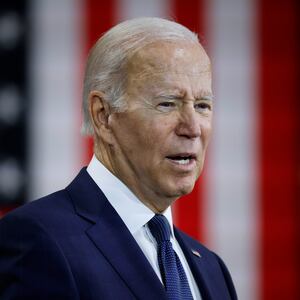As President Joe Biden crisscrosses the country in the final weeks before the midterm elections, a common thread has emerged in his private remarks before well-heeled Democrats: Fundraisers are for the real ones.
Speaking in lavish private homes, yacht clubs and Zoom calls to the bundlers and donors Democrats hope could help them hang on to their majorities in Congress, Biden’s remarks are nearly always longer and funnier, more blunt and more unwieldy than the speeches he’s delivered to the broader public while in office—a trend that one attendee of a recent event called “Free Joe Time.”
“The script is out the window, for better or worse. I think better, frankly,” they told The Daily Beast after attending one recent “reception,” as the fundraisers are euphemistically dubbed. “It’s authentic Biden—Biden being Biden, if you’ll pardon a tired phrase.”
Biden stayed true to that recent trend on Thursday, lambasting congressional Republicans for undermining government support for Ukraine while speaking before a Philadelphia audience of donors on behalf of U.S. Senate candidate John Fetterman.
“These guys don’t get it. It’s a lot bigger than Ukraine. It’s Eastern Europe. It’s NATO. It’s really serious, serious consequential outcomes,” Biden said of House Minority Leader Kevin McCarthy’s (R-CA) recent comments about cutting aide to the embattled country if Republicans retake the House. “These guys on the other team don’t get it. They don’t get it that how America does is going to determine how the rest of the world does.
“They have no sense of American foreign policy,” Biden said.
It was a representative example of Biden’s tendency to get free-wheeling with his language in such events, trying out words and sayings—“de minimis,” “centigrade”—that never appear in his scripted remarks. The remarks, which have averaged more than twice as long as his speeches in public in recent weeks, are nearly always studded with multiple apologies for their length and often concluding with the kind of lengthy question-and-answer sessions that reporters almost never get with the president. (Unlike many preceding administrations, Biden’s White House releases full transcripts of all his remarks to donors, a level of transparency that many of the politicians he’s hyping avoid if they can help it.)
“Maybe the best way to do it is conclude with this: You know, I’ve never been more optimistic about the chances for America than I have been,” Biden said at a fundraiser in Oregon on October 15, followed by roughly seven more minutes of speaking time before he admitted, sheepishly, “Folks, I’ve talked enough.”
The president has also gotten ahead of his skis on a host of issues with semi-regularity, making unanticipated news, particularly on foreign policy. Russia and China are frequent fixations of his in those private remarks, with almost every recent speech referencing the implied threats of nuclear strikes in Ukraine by Russian President Vladimir Putin—or, as Biden put it in a comment that was later reported to be unanticipated by White House staffers, “Armageddon.”
“Did any of you ever think you’d have a Russian leader, since the Cuban Missile Crisis, threatening the use of tactical nuclear weapons that would… could only kill three, four thousand people and be limited to make a point?” Biden said at a fundraiser in Los Angeles.
“I don't think there’s any such thing as an ability to easily lose a tactical nuclear weapon and not end up with Armageddon,” he said at another in New York City.
Those comments about Putin’s threats have, so far, generally not concluded with any particular strategic proposals for countering a potential nuclear crisis.
“It’s clearly on his mind,” said one Biden bundler. “Didn’t make me want to cut a check, particularly, but it’s valuable to know that he’s taking the threat seriously enough to discuss it with people whose perspectives he values.”
The White House did not return requests for comment about how Biden’s finance events are scripted, or whether they undergo the same drafting process as his more formal remarks.
Biden has never been regarded as a fantastic public orator, and even in the final push before the midterms, addresses that have been hyped as major events have nearly always been tightly timed and the president rarely announces new policies or positions in them. That trend has extended to other administration surrogates, even in their private remarks. Per publicly released transcript, Dr. Jill Biden and Vice President Kamala Harris have delivered messages in closed events that comport nearly verbatim with their stump speeches—the same jokes, the same anecdotes, the same opening and closing messages.
At an appearance discussing abortion rights at Washington, D.C.’s Howard Theatre on Tuesday, for example, which was billed as a major address on one of the most animating issues to the Democratic base, Biden spoke for a mere 13 minutes—a little under half of which was devoted to discussing other issues. Those remarks amounted to less than half the speaking time of private events in Oregon (26 minutes), Los Angeles (28 minutes) and New Jersey (30 minutes).
Occasionally—as he does in public remarks—Biden can get caught in the policy weeds, particularly on abortion. At the New Jersey event, for example, Biden went on a side-trail discussing the definition of the beginning of human life, ultimately calling the overturned Supreme Court decision Roe v. Wade a “happy medium.”
“I support Roe v. Wade because it meets the medium of every major confessional faith, which says that, you know, in the first trimester, it’s between you and your doc,” Biden said, not entirely accurately. “The question is: When does a human life [begin]? That’s been debated among religious scholars from all faiths for a long, long time. So, it’s about as happy a medium as you can get.”
But the free-form addresses have been a major cash booster for the Democratic National Committee, with events headlined by the president raking in more than $20 million this year so far.
“Can’t argue with cash,” the bundler said.
One potential reason for the president’s “occasionally meandering, it’s fair to say” remarks at fundraisers, one recent attendee suggested, is that as a long-term senator from Delaware in the days before super PACs, Biden never had to develop the fundraising chops that senators in more competitive races often need to stay in office. He has a reputation for being disinterested in the mechanics of what is euphemistically dubbed “donor maintenance,” and unlike his predecessors doesn’t have a straight line of communication to the White House for past bundlers or fundraisers.
That gives Biden a chance to be a bit more authentic, the donor said, pointing to remarks about his policies on burn pits in which he became emotional discussing his late son Beau’s exposure during his service in Iraq.
“And here’s the deal: He spent a year in Iraq, and he lived within about 300 yards of one of those burn pits, and he died of brain cancer,” Biden said at the Los Angeles event, held at the home of producer Marcy Carsey. “And a lot of people have suffered worse than I have. And he did.”
“He’s always been someone who wears his heart on his sleeve, and it’s that authenticity that we’re not used to seeing from politicians—particularly men of that generation—that is so appealing,” that donor said.







